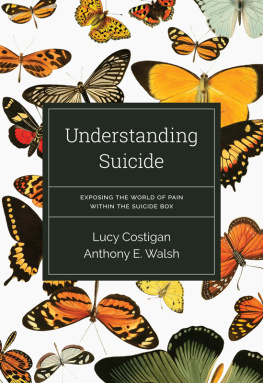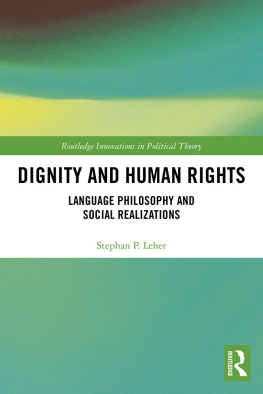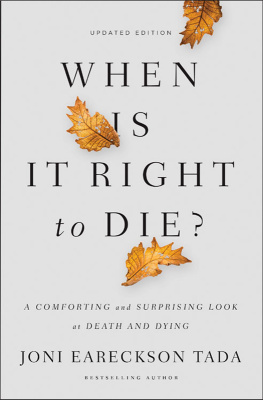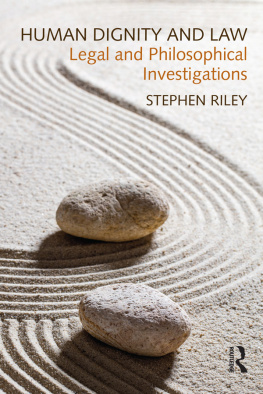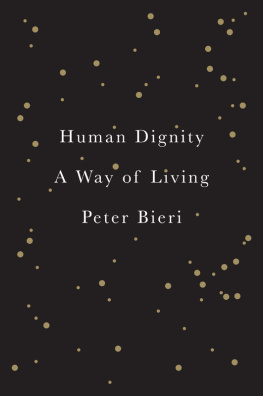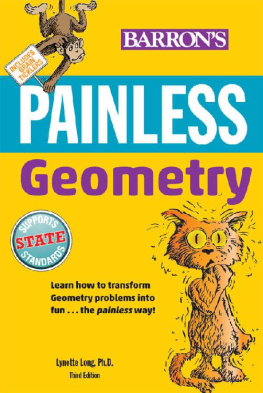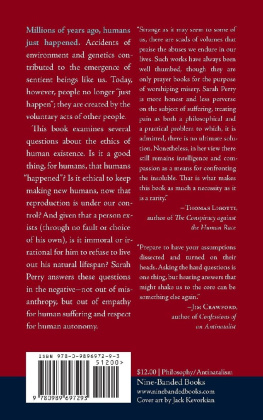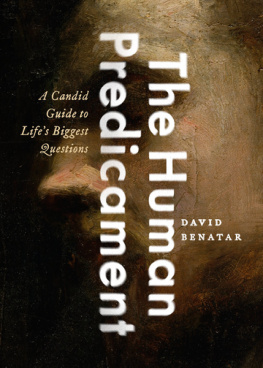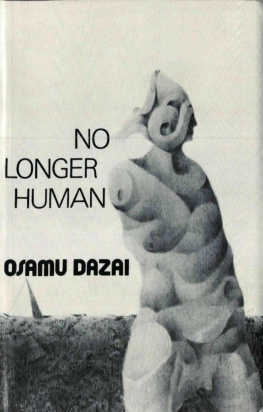JEAN LIBERTE
A manifesto for the right to painless suicide
A pro-choice essay on human dignity
Copyright 2020 Jean Libert
Tous droits rservs.
ISBN :9798608622984
To human beingsPREFACE
Il me semble d'ailleurs qu'on ne devrait lire que les livres qui vous mordent et vous piquent. Si le livre que nous lisons ne nous rveille pas d'un coup de poing sur le crne, quoi bon le lire ()
un livre doit tre la hache qui brise la mer gele en nous.
Voil ce que je crois
Franz Kafka, extrait d'une lettre son ami Oskar Pollak, 1904
The play's the thing wherein I'll catch the conscience of the King.
Hamlet, Act II, scene 2
What if Jean Libert's Manifesto were the very axe with which to break the frozen sea within us ? What if his essay were the very thing that catches our very conscience ?
What if the frozen sea within us were whatever teaching and preconceived ideas we have made ours ? Language is often the very cell we dwell in, a cell with its rules, with its inmates, with its screw, but like the prisoners of Plato's Myth of the Cave , we tend to mistake our jail for the real world despite the shadows of the real world that wave at us and which we are free to take heed of or not.
This Manifesto proposes to start us thinking, in Montaigne's tradition, no matter how much its contents will sting our conscience.
You may not agree with its thesis, or quite the contrary, it may shake you awake, like a Vanitas, dragging you from your Divertissement (Distraction), to refer to Blaise Pascal, but it would be a shame to discard it simply because it hurts mainstream thinking which you mistake for your own convictions.
Jean Libert fulfills his philosopher's mission, namely, the one meant to diagnose our collective neurosis and offer his recommendation so that we may be brave enough to stare death in the face without leaving it to society or whoever that is to decide to tamper with our lives when we can no longer think for ourselves.
I do recommend this Manifesto to anyone aware that he is a human being and not an object, so that he may ponder the very issue of death and his death while he may think. It is then up to him to decide whether or not he subscribes to Jean Libert's thesis.
As for society and its legislators, this Manifesto is meant to wave at them too
Jean-Claude Cauvin
An English translation ofManifeste Pour Un Droit Au Suicide Indoloreby
Jean-Claude CAUVIN
Introductory texts
Suicide : self-homicide. That is why some regard it as a crime. That is why I, for one, regard it as a right.
As I do not offend the laws implemented against thieves when I travel with my belongings or when I spend my own money, likewise, I do not infringe upon those laws against arsonists when I burn my own wood. I therefore do not feel concerned by the laws implemented against murderers if I put an end to my own life. Montaigne, Essais II, 3.
Let us make sure however that such a consideration is not upheld as a sacred principle. It is neither ethics nor metaphysics.
To commit suicide does not mean choosing one's death ( it is no choice of ours : we are bound to die anyway), but choosing the moment of one's death. It is a matter of opportunity rather than something pertaining to the absolute as some see it sometimes.
It is more or less a question of gaining time, of running ahead of the inevitable, of winning against nothingness, of winning the race against time and fate, so to speak. It is like taking a short cut as it were.
It is also an individual right, which is all the more absolute as it stands above the notion of right.
The best gift bestowed on us by nature, according to Montaigne, is to have given us the opportunity to end our lives (ibid).
It is the minimal and maximal freedom.
Andr Comte-Sponville, Dictionnaire Philosophique
In western societies devoid of legislation concerning the right to die, it is practically impossible to be entitled to a peaceful death.
Governments' logic is to leave people in utter ignorance so they live longer and happier : HOW WRONG !
Far from that, experience clearly shows that insofar as individuals access the necessary information to make a sensible decision, they tend not to worry so much. Knowing the ins and outs of our ageing and dying enables us to gain power. It is this very power which is the key to a longer and a happier life. CERTAINLY NOT IGNORANCE !
Philip Nitschke et Fiona Stewart, Pilule Douce
Cioran used to say : without having heard of suicide, I would long ago have killed myself . To this, I should like to add, if we were sure we had the right means to kill ourselves, we would not so much need to think about it ; we would be at liberty to think about it. The best way to undermine despair is to allow it to be considered. Knowing that one can die peacefully makes you feel like living.
Dominique dd, Humaniser la mort (article paru dans Libration)
Preamble
This manifesto is no eulogy of suicide, but of freedom rather.
Far be it from me to put forward a nihilistic philosophy upholding that life is nothing but suffering, and stupidly argue that life is not worth living and that the only option left is suicide.
We are well aware that life does bring joy to the one that is physically, psychologically and socially well-endowed and hereby likely to relish it.
However, we do argue that some extremely painful and excruciating situations justify resorting to suicide, and as a rule, that living or not living is a very personal choice.
Suicide ceased to be banned with the advent of the 1810 Napoleon Code.
However, there is no such thing as a right to suicide, which not only reveals a legal limbo on the matter, but also leaves those wishing to resort to suicide to their own devices.
We enjoy going to the cinema, but if one day, someone locked you up in a movie theatre, we sure would no longer enjoy watching a film at the cinema, and we would be reduced to begging to be let out. Likewise, being denied the right to use painless means to end our lives is tantamount to being locked up in life : it means not living deliberately but being forced to : it is a constrained choice.
By contrast, having those means at our disposal enables us to be human beings willing to live and die in keeping with our dignity, hereby refusing enslavement and too much suffering ; it enables us to free ourselves from our own fear of dying and thus allows us to enjoy life to the full. Life is sometimes a chance, but never a duty, therefore, why should suicide be either cowardly or guilty and even both ?
Last, in the face of a society praising profitability and by and large a dog-eat-dog world where entertainment in the pascalian sense of the term prevails, it is about time we reconsidered our perception of death in order to humanise the conditions of the dying.
These are the points that this manifesto proposes to expatiate on.
Chapter 1 : Fighting against the absurd so that living may become a deliberate choice
We do not choose to be born. In the beginning, life is no choice, it is enforced upon us. A man and a woman have sexual intercourse and inflict life upon us without our agreement : such is the commonplace scenario. Whether it is in vitro fertilization or other devices, this does not change the problem altogether : our personal agreement was not requested.
Likewise, we did not choose to grow up in such or such a country, in this or that family, in this or that social background, to be endowed with such or such genes, such or such gifts or such or such handicaps. How is it that I am not handsome, tall and genetically well-endowed like this one man ? Why was I not born into a rich family that bequeathed its wealth to me, hereby exempting me from working for a living ? These questions, which seem naive and are more often than not looked down upon as pointless moaning are nonetheless legitimate questionings yet unanswered. They bear witness to the fact that as soon as we are born, we fall prey to natural and social inequalities which have nothing to do with merit or worth.
Next page

